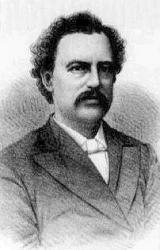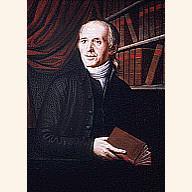1676 - 1711 Person Name: C. F. Richter, 1676-1711 Scripture: 2 Corinthians 6:4-10 Author of "Es glänzet der christen inwendiges leben" in Deutsches Gesangbuch für die Evangelisch-Luterische Kirche in den Vereinigten Staaten Richter, Christian Friedrich, son of Sigismund Richter, Rath and Chancellor to Count von Promnitz at Sorau, in Brandenburg, was born at Sorau, Oct. 5, 1676. At the University of Halle he was first a student of medicine and then of theology. In 1698, A. H. Francke appointed him Inspector of the Paedagogium, and then made him, in 1699, physician in general to all his Institutions. In company with his younger brother, Dr. Christian Sigismund Richter, he made many chemical experiments, for which he prepared himself by special prayer; and invented many compounds which came into extensive use under the name of the “Halle Medicines," the most famous being the Essentia dulcis, which was a preparation of gold. He died at Halle, Oct. 5, 1711 (Koch, iv. 354, &c).
Richter was one of the most important hymnwriters among the Pietists of the earlier Halle school; and his hymns possess the defects as well as the excellences of his school. They are emotional, and develop the idea of the spiritual union with Christ as the Bridegroom of the soul, with a minuteness that is hardly reverent (e.g. No. xi. below). They are also frequently not clearly thought out, and consequently somewhat obscure. Various of them are in unusual metres, and were wedded to tunes not very devotional in character. Apart from these defects there are various of his hymns worthy of note for their genuine, fervent piety, their childlike spirit of love to God, and the depth of Christian experience embodied in them. They appeared principally in the various Pietistic hymn-books of the period, especially in Freylinghausen's Gesang-Buch, 1704 and 1714, and were collected and appended (as his Geistliche Lieder) to an essay edited by his brother (named above) and published at Halle, in 1718, as Erbauliche Betrachtungen vom Ur sprung und Adel der Seelen.
Richter's hymns …which have passed into English are:—
i. Gott den ich als Liebe kenne. For the Sick. Included in Freylinghausen's Neues geistreiches Gesang-Buch, 1714, No. 647, in 7 stanzas of 8 lines, repeated, 1718, as above, p. 420, entitled, "Hymn in Sickness." According to Ehmann, in his edition of Gottfried Arnold, 1856, p. xii., it had previously appeared in Arnold's Heilsamer Rath und Unterricht für Kranke und Sterbende, 2nd edition, 1709. It is in the Unverfälschter Liedersegen, 1851, No. 603. Translated as :—
God! whom I as love have known. A full and very good translation by Miss Winkworth, in her Lyra Germanica, 1st Ser., 1855, p. 236. Repeated, abridged, in L. Rehfuess's Church at Sea, 1868, p. 53. A cento, in 5 stanzas of 4 lines, taken from st. v., vi., iii., and beginning, "Let my soul beneath her load,” is No. 398, in the Unitarian Hymns of the Spirit, Boston, U. S. A., 1864.
Another translation is: O God, Whose attributes shine forth in turn." By Miss Cox, 1864, p. 191.
ii. Heine Armuth macht mich schreien. Supplication, or Longing for Christ. In Freylinghausen's Gesang-Buch, 1704, No. 662, in 7 st. of 6 1. Repeated, 1718, as above, p. 381, and in the Unverfälschter Liedersegen, 1851, No. 769. Translated as:—
Unto Him my spirit crieth . A good translation of st. i., ii., vi., by A. T. Russell, in his Psalms & Hymns, 1851.
iii. Stilles Lamm und Friedefürst. Sanctification. A hymn on the Following of Christ the Lamb of God, and founded on Rev. xiv. 4. In Freylinghausen's Neues geistreiches Gesang-Buch 1714, No. 432, in 8 st. of 5 1. Repeated in 1718, as above, p. 364, entitled. "On the name Agneta, which may be derived from Agnus, which in German is called a Lamb." In Burg's Gesang-Buch, Breslau, 1746, No. 922. Tr. as:—
Thou Lamb of God, Thou Prince of Peace . A free tr., omitting st. iii., vii., by J. Wesley, in his Psalms & Hymns, Charlestown, 1736-7, p. 51, and Hymns & Sacred Poems, 1739 (P. Works, 1868-72, i.,p. 129). Included in the Wesleyan Hymn Book, 1780, No. 329 (1875, No. 338), and recently in the Methodist New Congregational Hymn Book, 1863, Mercer's Church Psalter & Hymn Book, 1857 and 1864, Holy Song, 1869, the American Methodist Episcopal Hymn Book 1849, and others.
Another tr. is: "Holy Lamb and Prince of Peace." By J. Gambold, as No. 38 in the Moravian Hymn Book, 1742 (1886, No. 486).
Eight others of his hymns have been tr. into English, viz:--
iv. Die sanfte Bewegung, die liebliche Kraft. Whitsuntide. In Freylinghausen's Gesang-Buch, 1704, No. 454, in 9 st.; and in 1718 as above, p. 393, entitled, "Of the Joy in the Holy Ghost." Tr. as: "This Impulse so gentle, this Movement so sweet," as No. 551, in pt. i., of the Moravian Hymn Book, 1754.
v. Es glänzet der Christen inwendigem Leben. The Life of Faith. In Freylinghausen's Gesang-Buch, 1704, No. 515, in 8 stanzas; and in 1718, as above, p. 398, entitled, "On the hidden life of believers." Repeated in the Unverfälschter Liedersegen, 1851, No. 410. It is Richter's finest hymn, and was (says Koch, viii. 249) a great favourite with Dr. F. Schleiermacher. It is founded on Col. iii. 3, 4, and gives a picture of what the inner life of a Christian should be: described from Richter's own experience. The trs. are: (1) "The Christian's Life inward displays its bright splendour." As No. 620, in pt. i. of the Moravian Hymn Book, 1754. (2) "All fair within those children of the light." By Mrs. Bevan, 1858, p. 26.
vi. Hüter! wird die Nacht der Sunden. Morning. A fine hymn, for use especially in Advent, and founded on Isaiah xxi. 11. In Freylinghausen's Gesang-Buch, 1704, No. 599, in 9 st.: 1718, as above, p. 401, and in the Unverfälschter Liedersegen, 1851, No. 460. Tr. as: (1) "Watchman! is the Night retiring." By H. J. Buckoll, 1842, p. 45. (2) "O Watchman, will the night of sin." By Miss Winkworth, 1855, p. 1. Repeated in Miss Warner's Hymns of the Church Militant , 1858, the Gilman-Schaff Library of Religious Poetry , 1881, &c.
vii. Jesu, gib mir deine Fülle. Supplication. A prayer to Christ as the Great Physician. In Freylinghausen's Gesang-Buch, 1704, No. 66, in 7 st., st. vii. being entitled "Answer." In 1718, as above, p. 406, entitled, "On Patience." In Burg's Gesang-Buch, Breslau, 1746, No. 289. Tr. as:— "Jesu grant Thou me Thy Fulness." In the Supplement to German Psalmody, ed. 1765, p. 47.
viii. Jesus ist das schönste Licht. Love to Christ. On St. John xii. 36. In Freylinghausen's Gesang-Buch, 1704, No. 349, in 9 st.: and in 1718, as above, p. 379, entitled, "On Desire towards God and Christ." In the Berlin Geistlich Lieder, ed. 1863, No. 808. Tr. as:— "Jesus is my light most fair," as No. 630, in pt. i. of the Moravian Hymn Book, 1754 (1886, No. 450).
ix. Mein Salomo dein freundliches Regieren. Peace in Believing. A fine hymn, founded on St. John i. 14. In Freylinghausen's Neues geistreiches Gesang-Buch, 1714, No. 512, in 11 st. In 1718, as above, p. 416; and in the Unverfälschter Liedersegen, 1851, No. 424. Tr. as:— (1) "My Solomon! thy kind and gracious Sceptre," as No. 622, in pt. i., of the Moravian Hymn Book, 1754. In 1789, altered to "Jesus, my King, Thy kind and gracious sceptre" (1886, No. 384). (2) "Jesus, my King! Thy mild and kind control." By Dr. Bomberger, in Schaff s Kirchenfreund , 1849, p.337.
x. O Liebe die den Himmel hat zerissen. Christmas. In Freylinghausen's Neues geistreiches Gesang-Buch, 1714, No. 34, in 9 st.: and in 1718, as above, p. 414, entitled, "On the Incarnation of the Son of God." In the Unverfälschter Liedersegen, 1851, No. 52. Translated as:-- "Oh! love that did the heavens rend asunder." By Miss Manington, 1864, p. 35.
xi. O wie selig sind die Seelen. Love to Christ. Founded on Hosea ii. 19, 20, and Eph. v. 25. In Freylinghausen's Gesang-Buch., 1704, No. 512, in 10 st.: and in 1718, as above, p. 396, entitled, "On the high dignity of believers." In Porst's Gesang-Buch, ed. 1855, No. 412. It was (says Koch, viii. 297) originated by a dream Richter had about 1700, that in the hospital at Halle he would find a truly Christ-like soul. After searching all the wards he found an old neglected patient in a garret, with whom he conversed, and whom he found to be the person he was seeking. Inspired by her relations of her inner experience, he embodied her thoughts in this fine hymn. Tr. as:— "O what joy for them is stored." By Mrs. Bevan, 1858, p. 68. [Rev. James Mearns, M.A.]
--John Julian, Dictionary of Hymnology (1907)
Christian Friedrich Richter


 My Starred Hymns
My Starred Hymns








